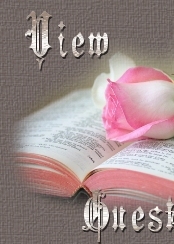Study to show yourself approved unto God,
a workman that needs not to be ashamed,
rightly dividing the word of truth. (II Tim. 2:15)
You have probably heard of the "hidden" or "lost" book of the Bible, known as the Apocrypha. Calling them "hidden" or "lost" books makes it seem
like our Scriptures are missing something; like there is some secret message contained in them that we are missing out on. However, the fact is, these
books add nothing doctinally to the books most Protestants acknowledge as Holy (divinely inspired) Bible.
The Apocrypha consists of 14 books. 1st and 2nd Maccabees contains the historical account of the struggle for Jewish independence led by the
Maccabee family. These books also contain the earliest references to the story of Hanukkah and the rededication of the Jewish Temple.
The other books are 1st and 2nd Esdras ,Tobit, Judith, Wisdom of Solomon, Sirach (Ecclesiasticus), Baruch, the Letter of Jeremiah, and the Prayer of
Manasseh, as well as additions to the books of Esther and Daniel.
The Jewish people knew of these books, but the sacred canon, or the Hebrew Bible, did not contain them. They were, however, included in the Greek Septuagint. They were
probably included for the historical details contained in some of these books; they gave an accounting of what happened during the time between the Testaments, that 400 year period when God did not speak to His people.
The Septuagint is one of the oldest and most complete manuscripts. Almost all our modern translations, including the Authorized
King James Version, were translated from the original Septuagint. They were not included as part of the sacred books of the Holy Bible for the first four centuries of the Christian Church,
for many reasons. They were never part of the original Hebrew Scriptures.
Not one of them is in the Hebrew language, which was the language used by the inspired historians and poets of the Old Testament.
Not one of the writers claimed any divine inspiration as the source of their writings.
The New Testament writings include more than 250 quotes from the Old Testament, but not a single quote or reference to any book of the Apocrypha.
Furthermore, these writings contain multiple doctrinal and historical errors, further evidence against them ever being divinely inspired.
Sometime around 380 - 400 A.D. Jerome, a priest and historian who had devoted himself to theological studies, undertook a revision of the Jewish Scriptures and Greek manuscripts,
a process that took many years.
Jerome, later granted sainthood by the Roman Catholic church and others, did not believe that the books of the apocrypha were Divinely inspired
scripture; however, he thought it was still useful to study them, because of some of their historical details. Jerome placed these books in a separate
section at the end of his Latin Vulgate translation of the Old Testament, and gave them the name we know them by today, Apocrypha, which means “hidden”.
At the time of the Protestant Reformation in 1517 A.D., Martin Luther did not consider these books as part of Scripture, but like Jerome, thought they were still
useful for study. He followed Jerome's practice of placing these books at the end of the Old Testament under the title “Apocrypha”, thus indicating that
they were not to be considered part of the Holy Scriptures. Most Protestant Bibles today do not contain these books.
The Apocryphal books remained grouped in the back of the Old Testament - with the Divinely inspired Scriptures, but not a part of them - until 1546. At that time, at the Council of Trent, the Roman Catholic Church
officially declared these books to be also inspired by God. They were declared to be deutorocanonical, or a secondary canon.
(The Roman Catholic Church had previously accepted the Apocryphal books at earlier councils at Rome in 382 A.D., Hippo in 393 A.D., Carthage in 397 A.D., and Florence in 1442 A.D.. However, these were local, not universal Church councils.)
These books have been included in the Catholic versions of the Bible ever since, once again scattered among the Old Testament. (Douay-Rheims, Confraternity, Knox, Revised Standard, and Revised New Jerusalem are among these Roman Catholic versions.)
The reason for them to be included in the Roman Catholic Bible is pretty clear. Some of these books contain passages that support certain distinctively Roman Catholic doctrines, such as purgatory, praying for the dead, and the treasury of merit,
things that the Roman Catholic church continues to
endorse, even though they contradict the clear teachings of Scripture.
One such doctrine is that of offering prayers for the souls of the dead. (2 Maccabees 12:41-45)
The Bible teaches that only through Jesus Christ as our Lord and Savior can our souls be saved: no amount of prayers from another
can save us after we have died; we have to call upon the Lord for ourselves, BEFORE we die!
"Neither is there salvation in any other: for there is none other name
under heaven given among men, whereby we must be saved." (Acts 4:12)
"That if thou shalt confess with thy mouth the Lord Jesus,
and shalt believe in thine heart that God hath raised him
from the dead, thou shalt be saved." (Romans 10:9)
"For whosoever shall call upon the name of the Lord shall be saved." (Rom. 10:13)
Another unique doctrine contained in the Apocrypha is that by giving alms or honoring parents one can atone for their own sin.
The book of Sirach teaches: “Whoso honoureth his father maketh an atonement for his sins...Water will quench a flaming fire; and alms maketh an atonement for sin” (Sirach 3:3, 30). However, this doctrine clearly contradicts the constant teaching of Scripture , which says that atonement is only made by a blood sacrifice.
“For the life of the flesh is in the blood: and
I have given it to you upon the altar to make
an atonement for your souls: for it is the blood
that maketh an atonement for the soul.” (Lev. 17:11)
And almost all things are by the law purged with blood;
and without shedding of blood is no remission." (Heb. 9:22).
It is only through Jesus Christ that we are justified in God's sight, because He was the atoning scarifice for the sins of the whole world. Nothing we could ever do could make us righteous. No matter how
how perfectly we obey the law (as if we ever could!), no matter how much we give to charity, the only thing that can cleanse us from all unrighteousness is the precious blood of Jesus!
"In whom we have redemption through his
blood, even the forgiveness of sins" (Col. 1:14)
Sirach teaches that a person can be justified by another method apart from substitutionary sacrifice.
If we could obtain righteousness on our own by such things as obeying the commandments and doing charity, there would have been no need for
Christ to shed His blood as an atonement for our sins. This book teaches a doctrine of justification by the works of the law which is directly refuted by the Bible:
“A man is not justified by the works of the law” (Galatians 2:16).
"Therefore by the deeds of the law there shall no flesh be justified
in his sight: for by the law is the knowledge of sin." (Rom. 3:20)
In fact, the apostle Paul goes as far as to say:
“I do not nullify the grace of God: for if righteousness comes
by the law, then Christ is dead in vain.” (verse Gal. 2:21).
The book of Tobit 12:9 also repeats the heretical teaching that “alms doth deliver from death, and shall purge away all sin.”
Being assured by the Word of God that Christ’s blood really cleanses from all sin, we cannot accept any teaching that promotes an alternate method of purging sin apart from Jesus Christ's blood sacrifice.
Another contradictory doctrine in Sirach 12:4-7 advices, “Give to the godly man, and help not a sinner. Do well unto him that is lowly, but give not to the ungodly; hold back thy bread, and give it not unto him... give unto the good, and help not the sinner.” This also directly contradicts the word of God:
“But I say to you who hear: Love your enemies, do good
to those who hate you. .... And from him who takes
away your goods do not ask them back” (Luke 6:27-30)
“If your enemy is hungry, feed him; if he is thirsty,
give him a drink;” ( Prov. 25:21; Rom. 12:20,)
These are just a few examples of the doctrinal errors contained in the Apocryphal writings.
They also contain many historical errors. For example, Tobit claims to have been alive when Jeroboam revolted (931 B.C.), and when Assyria conquered Israel (722 B.C.). These two events were separated by over 200 years, but Tobit only lived to be 158 years old! (Tobit 14:11)
The book of Judith is filled with errors. She identified Nebuchadnezzar as king of the Assyrians, instead of the king of Babylon.
In fact, there are at least fourteen errors in that book regarding the people and geography of Assyria, Babylon, Persia, and even Israel itself.
The Catholic New Jerusalem Bible even goes so far as to say: "The book of Judith in particular shows a bland indifference to history and geography." It includes numerous footnotes in the book of Judith,
pointing out the historical inaccuracies of that book. And "The Catholic Bible : Personal Study Edition" (New American Bible)
says this: "There have been several attempts to classify the Book of Judith according to its literary type. Clearly it is not history.
It is useless to try to read it against the backdrop of Jewish history or that of other nations in the ancient world. There are just too many
historical errors. Is it then a historical novel, Midrash, or a fictional drama? None of these is completely satisfactory."
However it came to be, these books were part of the oldest known manuscripts, the Septuagint and the Latin Vulgate. They do
contain a lot of historical information, and examples of great devotion to the Lord.
They can be interesting reading for any serious Bible student who has enough knowledge of Scripture to recognize both the doctrinal and
historical errors contained in them.
It is up to each one of us to examine every teaching, to make certain it matches up to what we know to be the inspired Word of God.
Beloved, believe not every spirit, but test the spirits
whether they are of God: because many false
prophets are gone out into the world. (I John 4:1)
Some of the references used for this study include:
http://www.justforcatholics.org/a109.htm
http://www.biblequery.org/Bible/BibleCanon/WhatAboutTheApocrypha.htm)
https://www.gotquestions.org/apocrypha-deuterocanonical.html
https://www.biblica.com/resources/bible-faqs/why-do-some-bibles-have-a-section-called-the-apocrypha/
http://www.myjewishlearning.com/article/omitting-the-maccabees/
http://www.bible.ca/catholic-apocrypha.htm
https://carm.org/reasons-why-apocrypha-does-not-belong-bible


 To assist you in your Bible Studies,I am very pleased to be
To assist you in your Bible Studies,I am very pleased to be
able to add this King James Bible Search Engine.
The results of your search will open in a separate window.
My sincere thanks to "King James Version Of The Bible"
who made this search engine available.

  | |